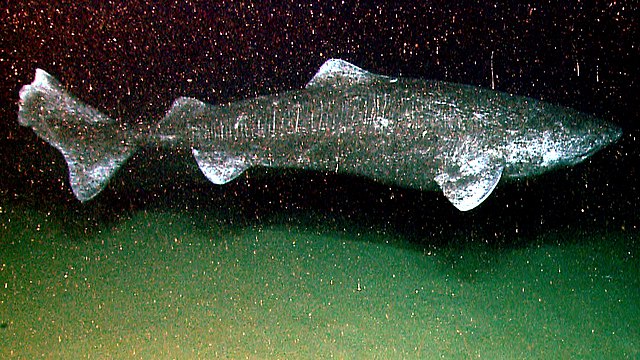
Why do Greenland sharks live so long? Partly because of their very slow metabolism.
Greenland sharks are large sharks that live in the northern parts of the Atlantic Ocean and in the Arctic Ocean. They live near Greenland, hence the name. They can grow up to 7 meters in lengths and they can weigh up to 1,400 kg. They eat mostly fish but they also prey on seals. They are extremely slow, so they probably only catch seals that are asleep. They hunt fish by creeping up on them, using their camouflage to remain hidden, and then opening their mouth to suck in the fish. They are also scavengers and eat animals that have fallen into the water and died.
Greenland sharks are notorious because of their long lifespans. They regularly live over 200 years and one shark was thought to be between 272 and 512 years old. The age of the shark was worked out by using radiocarbon dating. You can tell the age of most sharks by looking at the number of rings on their vertebrae. Every year their vertebrae grow and that makes a ring, similar to those on a tree. Unfortunately, you can’t count those without the shark being dead. This method of counting doesn’t work with Greenland sharks because they don’t have hard tissue in their body and their vertebrae are too soft to form rings. Scientists were at a loss on how to age the sharks until they found they could radiocarbon date the crystals in the lenses of the sharks. There are proteins that form in the eye before birth and they don’t degrade with age. Scientists radiocarbon dated the crystals in the lenses of the eyes of 28 sharks. There was some margin of error, but the oldest of the sharks they looked at could have been 512 years old. Unfortunately, they can’t radiocarbon date live sharks. The sharks they tested had been caught in fishing nets. It seems a shame that our fishing practices accidentally killed a 500-year-old shark.
So, why do Greenland sharks live so long? They are the longest lived of any vertebrate animal. The next longest lived vertebrate is probably the giant tortoise and some specimens have been known to get close to 200 years old. What do these two animals have in common? They both have very slow metabolisms, and this could be one of the secrets to the Greenland shark’s long life.
Metabolic rate is the amount of energy that an organism uses for all of its processes every day. Every organism burns energy to move, to keep warm, and for many other processes. They have to eat food to replace that energy. Cold blooded animals have slower metabolisms because they don’t need to use energy to warm themselves up. The higher an animal’s metabolic rate is, the shorter its lifespan seems to be. This doesn’t always hold true, but it appears that the organs, such as the heart, have to work faster and they wear out more quickly.
The Greenland shark does two things to keep its metabolism down. It doesn’t move very fast, and it keeps its body temperature very low. The Greenland shark has a top speed of 2.9 km/h. For comparison, a great white shark has a top speed of 56 km/h. Michael Phelps, the Olympic swimmer, has a top speed of about 8 km/h. Because the Greenland shark is so slow, it has to sneak up on its food, but the slow speed means that it doesn’t burn a lot of energy when moving. Secondly, sharks are cold blooded animals, which means they don’t need to use energy to warm themselves up. On top of that, Greenland sharks live in water that is from -1 to 10 ˚C. They also dive to depths of 2,200 m, where it is even colder. The cold slows down their metabolism even more and their hearts only beat about 5 times a minute. All of this means their hearts and organs are very strong, and it is probably the reason why they live so long.
Greenland sharks live for hundreds of years, but they are facing a threat of extinction that they have never faced before. Greenland sharks are eaten by people that live in Iceland. They bury the sharks and eat them when they are rotten and fermented. It is called hakarl. The Greenland shark is actually toxic unless it is fermented for several months. It is a very popular food in Iceland and the Greenland sharks are being overfished. They live so long and take so long to mature that any fishing of them is not really sustainable. Unless something is done, they may go extinct. And this is what I learned today.
Image By NOAA Okeanos Explorer Program – http://oceanexplorer.noaa.gov/okeanos/explorations/ex1304/dailyupdates/media/aug16.html, Public Domain, https://commons.wikimedia.org/w/index.php?curid=28162084
Sources
https://www.nbcnews.com/mach/science/can-weird-shark-show-us-how-live-centuries-ncna812671
https://oceanservice.noaa.gov/facts/greenland-shark.html
https://en.wikipedia.org/wiki/Greenland_shark
https://www.sportdiver.com/how-can-you-tell-how-old-shark-is
https://uni.hi.is/scampana/sharks/ageing-sharks/
https://oceanwide-expeditions.com/blog/8-facts-about-the-greenland-shark
https://www.bbc.co.uk/bitesize/guides/zg2xxnb/revision/1
https://en.wikipedia.org/wiki/Rate-of-living_theory
